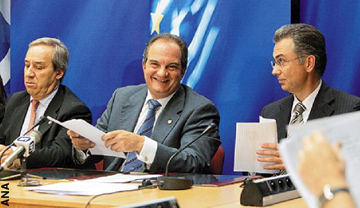Prosecutors resign over coverup

Opposition Pasok charges a judicial coup in Vatopaidi scandal, calling fora preliminary criminal probe of ministerial responsibility
THE TWO appellate court prosecutors assigned to the case of the state land exchanges with Vatopaidi Monastery – Ilias Koliousis and Eleni Sotiropoulou – took the unprecedented step of resigning completely from the judiciary on October 14, charging a coverup of findings of ministerial responsibility, which required sending the entire case to parliament for an investigation.
In their resignation letter, the two prosecutors said they discovered “evidence related to the acts of deputy ministers, and hence we no longer had authority for further investigation, but rather the case should have been submitted through the supreme court prosecutor to the Greek parliament, which is the only organ competent to evaluate it”.
Pasok called for the resignation of Justice Minister Sotiris Hatzigakis, who declared on October 15 that he will not step down.
Instead, the appellate court’s chief prosecutor on October 7 asked the two prosecutors handling the case to hand over all the files. The supervisor, Kyriakos Karoutsos, ignored his colleagues’ view (based on Article 85 of the Greek constitution) that the law mandated sending the case to parliament, and he ordered further investigative acts. Koliousis and Sotiropoulou concluded that “under existing law a prosecutor is not allowed to evaluate data linked to acts of cabinet members and deputy ministers”.
The resignations caused such alarm in the government that Prime Minister Costas Karamanlis himself intervened, asking Hatzigakis not to accept them and to offer assurances that their judicial independence be honoured completely. But the prosecutors appeared relentless.
For the first time, the premier left open the prospect of a sweeping cabinet reshuffle, for which many ruling party MPs have been clamouring.
But Karamanlis rejected, for now, Pasok’s calls for a preliminary criminal investigation in parliament, which would have the authority to file criminal charges and put suspect ministers on trial. Instead, he agreed to a parliamentary committee of inquiry, which has no powers to prosecute.
Even this is a reversal of his stated policy of allowing the judiciary to do its job without political interference. Asked why he caved in to opposition calls for a parliamentary inquiry, Karamanlis maintained that he “feels strong” politically and sent the case to parliament to bring “everything to light” and show that the government has nothing to hide.
Parliament will vote on ND’s proposal on October 22 and will put Pasok’s to a vote on October 24.
Land dispute
The scandal diverted attention from Karamanlis’ attempt to focus on measures to combat the financial crisis, which was the aim of the EU summit he attended that same day. That included a political pledge to cover all Greek bank deposits (legally the deposit guarantee was hiked from 20,000 to 100,000 euros).
Government spokesman Theodoros Roussopoulos – many of whose fellow New Democracy MPs have accused him of having a key role in the Vatopaidi scandal – said on October 15 that the government is not ruling out the possibility of a criminal probe if new evidence offered by the judiciary warrants that.
Pasok MP Andreas Loverdos charged a government coverup during parliamentary debate on October 15.
The name of Pasok leader George Papandreou topped a list of over 100 Pasok MPs’ names on an October 15 parliamentary question calling for a criminal probe of the acts of three ministers.
Petros Doukas, as deputy finance minister (he is now deputy foreign minister), is accused of responsibility in acts leading to recognition of Vatopaidi’s title over Lake Vistonida, which was traded for hundreds of millions of euros of prime public property. Former agriculture minister Evangelos Bassiakos is accused of pushing forward the scandalous exchanges. Both Doukas and Bassiakos are blamed by Pasok for instructing the Hellenic Public Real Estate Corporation to proceed with the 260 land exchanges that damaged the public interest. Roussopoulos is accused of playing the role of mastermind, coordinating the deals and pulling the strings behind the scenes.
Greek press reports have spoken sarcastically of a “miracle” because Vatopaidi Monastery exchanged 108 percent of Vistonida for prime, state-owned real estate. The monastery, after one exchange, made over 40 million euros on the sale of one 2004 Olympics venue alone.
Leftwing Syriza and the Greek Communist Party supported the government’s call for an investigative committee to probe the case. They say such a committee could also review the role of Pasok ministers, who are protected from criminal prosecution by a statue of limitations. But they would also support a possible parliamentary criminal probe, after clear evidence of a ministerial crime arises. Based on parliament regulations, a vote to reject the criminal probe would then block even a simple parliamentary probe.
Parliament’s right to probe criminal responsibility of ministers elected in the last general elections (September 2007) expires in June 2009.
“We want a parliamentary preliminary criminal investigation to attribute responsibilities where they belong,” Laos president George Karatzaferis said during the October 15 debate.
A criminal investigative committee would have 12 members from all parliamentary parties and could put ministers on trial in a special court.
Meanwhile, the abbott of Vatopaidi Monastery, Efraim, lashed out at the ministers and top state functionaries who co-signed the land exchanges, mocking Supreme Court Prosecutor George Sanidas’ opinion that ministers were “misled”.
“They [the land exchange deals] were reviewed and ratified by the top of the pyramid of state and judicial authority,” Efraim wrote in an October 14 open letter.
The letter clearly suggested that the premier himself approved the transactions and made clear that the monk has no intention of being made into a scapegoat.

